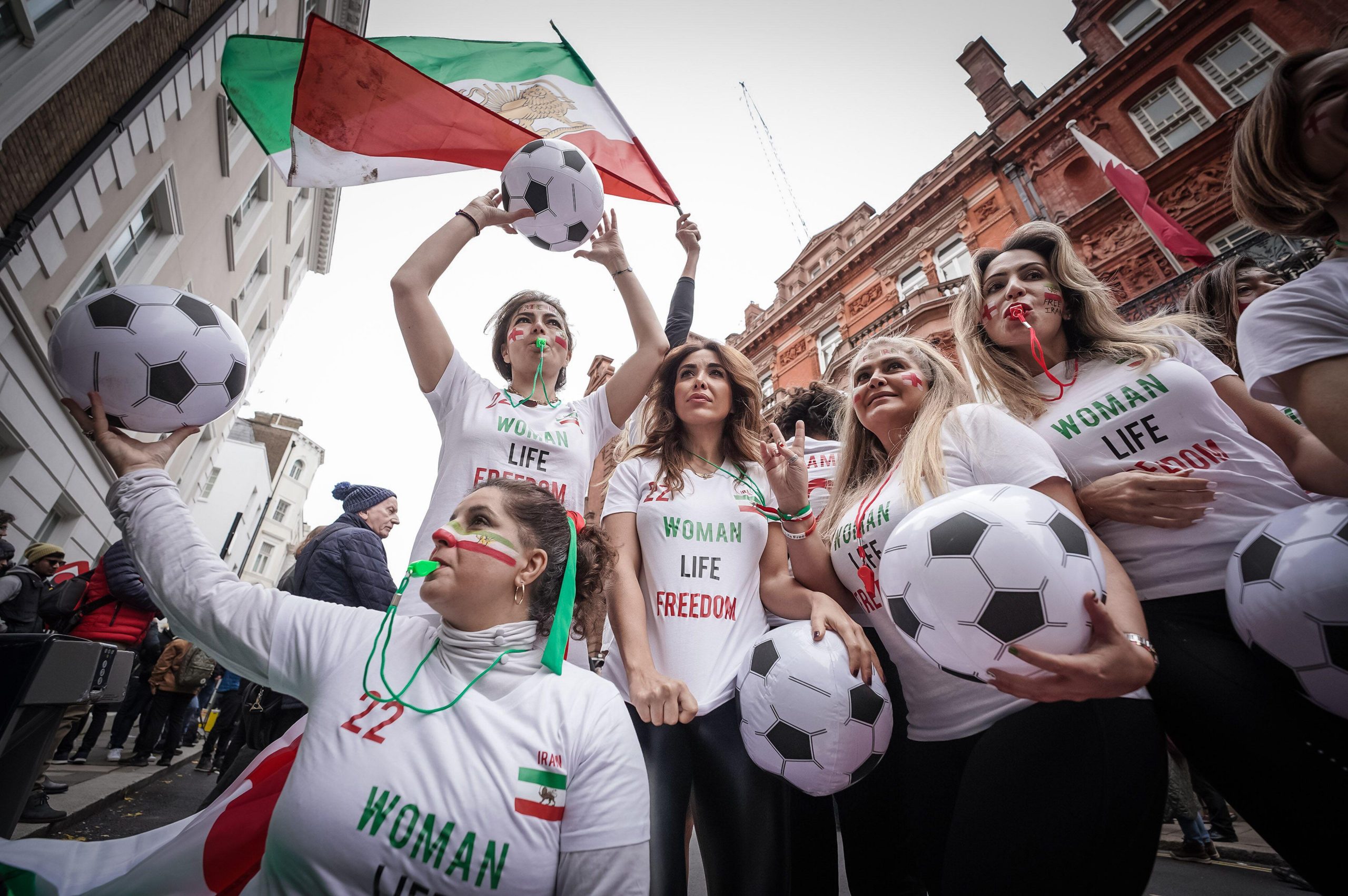The football commentator’s well-worn cliché about the sport being a game of two halves usually refers to the action on the pitch. But in the build-up to the game between England and Iran at the 2022 FIFA World Cup earlier this week, it was the off-field actions of the teams which showed a divided response to events in the wider world.
Shortly before kick-off, it was decided by the English FA (among other European football governing bodies) that England’s Harry Kane would forgo wearing the OneLove captain’s armband, which displays a heart containing colours representative of all backgrounds and is part of a message promoting inclusion. The reason given by the FA was that “we can’t put our players in a position where they could face sporting sanctions including bookings.”
Then, just before the match, as the Iranian national anthem rang around the Khalifa International Stadium in Doha, the Iranian players remained silent. Referencing the now-months long protests in Iran, which are pushing for regime change after the death of 22-year-old Mahsa Amini in Tehran on 13 September 2022, Iranian captain Ehsan Hajsafi said that: “We have to accept the conditions in our country are not right. Our people are not happy. We are here but it does not mean we should not be their voice or must not respect them.”
The actions, or rather inactions, of the English FA and the Iranian footballers have had contrasting results. By aiming first but then relenting on the promise to have Kane wear the armband shows just what a failed empty gesture it was. A financial fine would have been accepted, but the fear of a single yellow card forced the FA’s hand (and that of other countries, such as Wales, Germany and the Netherlands). Were the teams and players ever really behind it if they could u-turn so quickly?
On the other hand, the silence of the Iranian footballers has shown the courage that a united action brings, not least given how much higher the risks – the repercussions the footballers may face on the return to their homeland, where they will have family and friends, are far more severe than a card brandished on the pitch.
That said we should be careful about where we lay blame in terms of not wearing the armband. It is understood that Kane still wanted to wear it, and even if he didn’t, is it fair to expect the England players to be politically active in the course of what essentially is their day job (as Julian Baggini argues in our last issue)?
The bigger fault lies squarely at the hands of FIFA for awarding the tournament to Qatar, as well as the governments and authorities around the world who have said very little about the country’s abuses since 2010. When news organisations have reported on abuses, especially on the Kafala system, which ensured an extremely cheap labour force was on hand to build the infrastructure for the World Cup, journalists were detained and threatened – again to very little public outcry. While minor changes have been made to improve the labour system, reports that at least 6,500 migrant workers still died since 2010 has again received far too little outrage.
Even during the immediate build up to, and including the tournament so far, FIFA appears happy to kowtow to Qatar’s last-minute demands. While the consumption of alcohol isn’t a free speech issue, FIFA’s agreement to Qatar’s last-minute ban on the sale of alcohol in stadiums is yet another sign that it is Qatar who are setting the rules. Also, despite assurances from FIFA, rainbow-coloured flags and attire were prohibited in spectator areas, as seen by the Welsh fans who had rainbow-coloured bucket fans confiscated before their opener against the USA. In a nation where homosexuality is still illegal these are hardly surprising actions but they show how arguments like “the World Cup will improve the rights situations in Qatar” was never a commitment taken seriously. The activist Peter Tatchell, an Index contributor who was himself detained following a protest to highlight LGBT rights in Qatar in October, puts it well: “#FIFA and #Qatar promised that LGBT+ fans & rainbow insignia would be allowed at #WorldCup. They have trashed that promise – and their reputations. But what did you expect from a sexist, homophobic & racist dictatorship?”
We at Index on Censorship love the fact that football is the world’s game, able to unite people across gender, race, religion and nationality. From Norway to Nigeria, it’s the universal language where a conversation about Manchester United or Lionel Messi can take place without knowledge of the native tongue. We have no issue with football and our Autumn issue showed its amazing power to transform lives. It’s for this reason that we remain angered that it is taking place in Qatar, who seem to be normalising their autocracy on a world stage. And it’s for this reason that we are angered that the simple threat of a yellow card has determined a retreat from taking a stand on such an important issue, even if that stand was small and largely symbolic. Iran might have lost against England on Monday but they proved to be the real winners when it came to courage and conviction.













